I’d like to talk with you about a delicate subject, and that is what does a Christian do, according to the Bible, with the body of a loved one?
Is cremation okay? Does God expect burial? Perhaps this is a debate you’re wrestling with yourself. Or perhaps it’s a conversation you need to have with a bereaved relative or friend.
This is a very delicate subject, and anytime you’re dealing with people’s feelings, especially about death, you want to use great love, great tenderness, great dignity as well as due honor and exceptional understanding.
So, in a nutshell, what references are there in the scriptures about cremating our dead?
Although cremation is featured several times in bible verses it is never condemned or forbidden which gives Christians (and Jews) a choice between traditional burial or cheaper cremation. By still following other teachings in the Bible, followers can freely choose how they dispose of their dead.
In this article, I will go to the scripture and look to God’s word in detail for guidance on this matter and hope that it will help you in your decision.
Does the bible forbid cremation?
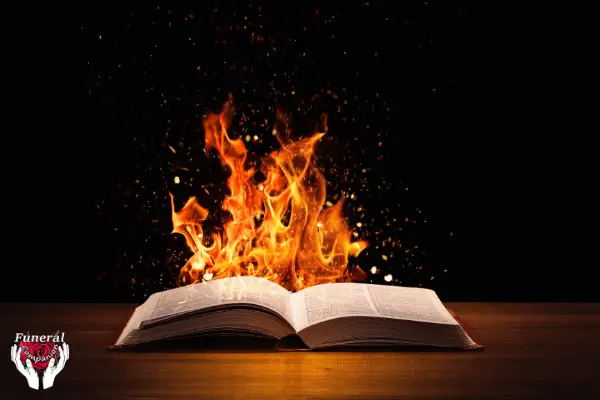
If you scour the words of the Bible, what you’re going to find is that God really has not given guidance specific guidance about what to do with the dead body. It certainly does not say that cremation is wrong or carries some divine penalty
What is found in the Bible is some of the cultural aspects of death and funerals at the time, but there are a lot of aspects left out. There are things, for example, that the Persian said, that we’re going to cover, that the Bible doesn’t even go over.
What burial practices are mentioned in the Bible?
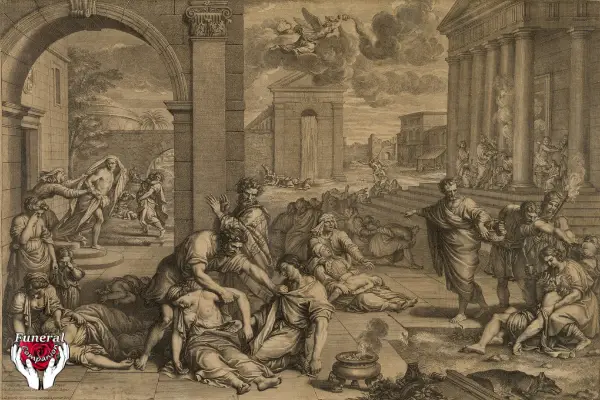
So the Bible doesn’t give us any direct revelation or any direct direction as to what we should do with the dead body of a loved one. This may explain why society at the time of the Bible did many different things to their dead.
For example, the Egyptians practice mummification, which certainly isn’t practiced today but nonetheless is pertinent to the biblical culture. And so it shows up in the Bible.
Burial practices in the Bible
The usual way that dead bodies were handled in the biblical world was predominantly burial. And there were many different types of burial in the biblical world because they had no way of preserving the body effectively and keeping it from decaying or spreading disease.
The custom was that you buried a body the same day that the person died and that custom, of course, could be stretched or changed a little bit here and there. But by and large, people living at the time the Bible records buried their dead extremely quickly.
This burial took many different forms. Bible verses speak of direct burial in the ground. It also mentions burial in a crypt above the ground. In addition, like with Jesus Christ, there were burial caves, and these would be known as ancestral caves.
Abraham famously bought the cave of Mac Piela Hittite and buried his wife, Sarah there. And then when Abraham died, he was buried in the same case. Upon Isaac’s death and that of Leah, they were both buried in the same cave. So that’s why they were known as ancestral burial caves.
Although we are talking about burial here, it didn’t necessarily mean they were covered with eath. Sometimes people were just laid in the grave and wrapped, like with Jesus Christ, in cloth and spices.
Alternatively, the dead body was laid in what was known as a sarcophagus, which means ‘flesh eater’ in Greek. The body would remain in the sarcophagus until the flesh rotted, and then the bones were retrieved which would be buried or sometimes placed in the little box and put in a burial cave.
Sometimes in biblical cultures, a body was just exposed to the air in a similar fashion to some of the American Indian tribes and the Persians.
Many criminals were just executed and then their dead body was just thrown on the ground. They weren’t even given a burial. In fact, that’s what Goliath said he was going to do to David. “I’m going to leave your body on the ground for the, for the birds of the air and the beasts of the earth.”.
Jehoiakim, for example, was an evil king of Judah and the word of prophecy said that was what was going to happen to his body
He will have the burial of a donkey—
dragged away and thrown
outside the gates of Jerusalem.
Jeremiah 22:19
Cremation in the Bible
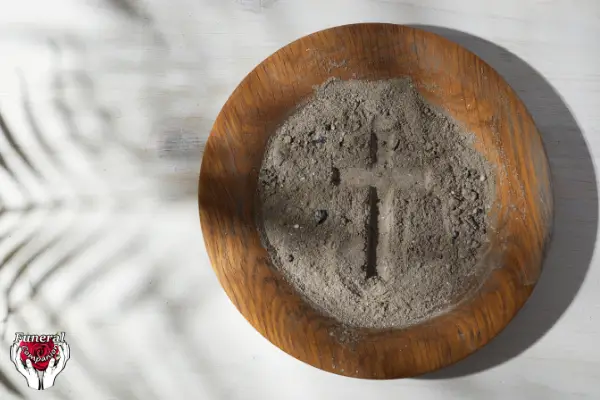
Now, when it came to cremation, this isn’t well documented in the biblical world, but some Greeks, for example, practiced cremation. It seems that Romans, as well as Jews, preferred, burying the dead.
There are examples in the Bible of bodies being cremated when they had been desecrated. For example, that of King Saul, and his son who had been killed by the Philistines.
All the valiant men arose, and went all night, and took the body of Saul and the bodies of his sons from the wall of Bethshan, and came to Jabesh, and burnt them there.
1 Samuel 31:12 (KJB)
In this case, the bodies of the Royals were cremated, and then the bones were taken and buried.
How to decide between burial or cremation as a Christian?
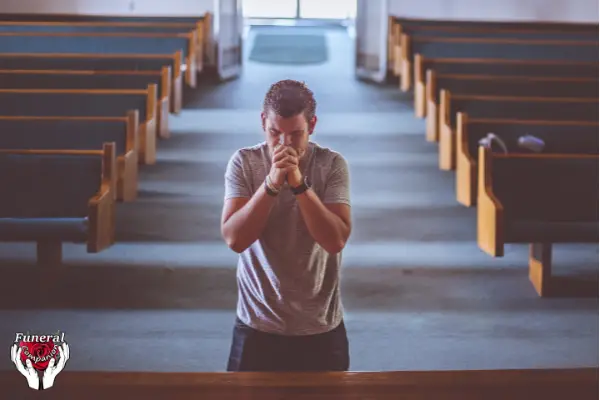
As you read the Bible, there is no command of God about what is the proper thing to do with a dead body. But could there be hidden messages on those pages?
Whatever you are going to do with the dead body it’s important to follow the second commandment, ‘love thy neighbor’. We’re supposed to do everything with love, whatever we do with the dead body, we should do it with great love, great tenderness.
The second thing we learn is that no matter what happens to your body, even if you are mummified, buried, cremated, exposed, or whether you fall off a ship and drowned in the sea, and they’ve never found your body, whether you burned up in a house fire, for example, and there wasn’t much left of your body, eventually what God said what would happen.
By the sweat of your brow
you will eat your food
until you return to the ground,
since from it you were taken;
for dust you are
and to dust you will return.
Genesis 3:19
Eventually, every dead body will return to dust. And we need to keep that in mind, how we get to dust may be different. It may be through cremation. It may be through burial and decay, but eventually, every dead body will get to dry dust.
This brings us to another interesting point. God doesn’t emphasize in the Bible what we should do with a dead body, but what he does emphasize over and over again, is what we should do is living bodies.
What he does say is this:
Whatever your hand finds to do, do it with all your might, for in the realm of the dead, where you are going, there is neither working nor planning nor knowledge nor wisdom.
Ecclesiastes 9:10
So, I think this is telling us that we need to maximize the gift that God has given us. We need to live for God now. And when we die, then we make a loving decision about what happens to the body, which will, according to God in his word, eventually return to dust.
Bible versus which discuss death and loss
- 22 Verses From The Letters To The Corinthians About Death
- 82 Old Testament Verses About Life & Death (Free PDF)
- 120 New Testament Verses For Funerals (Free PDF Download)
What does the Jewish faith say about cremation?
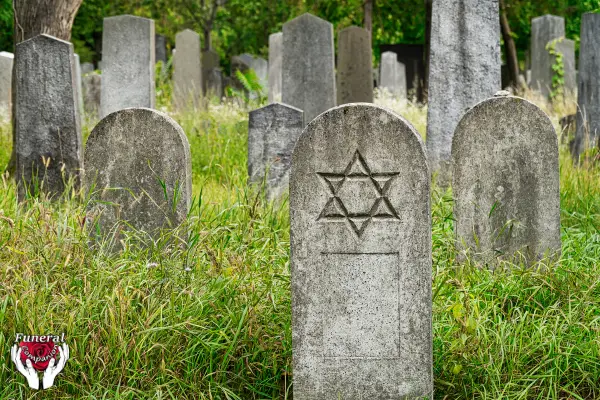
As Judaism and Christianity share some holy scriptures, it would be interesting to look at that religion and see how it compares with Christianity in terms of cremation
Until recently after death, most people were buried, but that’s changing for less traditional Jews. Meaning those who don’t keep kosher or Shabbat around 20 to 40% choose cremation.
That said it’s undeniable that Judaism says to bury your dead. Many traditional Jews believe that if your parent or any relative asks to be cremated, you should ignore that request and bury them regardlessOther Jews see it as a choice. It’s a question of keeping tradition versus following current trends.
People choose to be cremated for a variety of reasons. Some think it’s better for the environment or they don’t like the idea of using limited land for burial. Perhaps surprisingly, some choose it to show solidarity with their relatives who died in the Holocaust.
The major issue is cost. Cremation can be significantly less expensive than traditional funerals with a burial. And for many, scattering the ashes can have a beautiful, connected feeling of returning to the earth. For dust you are, and to dust, you shall return.
So why does traditional Judaism reject cremation?
For one there’s a deep respect for the body. When a Jewish text with God’s name is no longer usable, we don’t simply throw it out. We’re supposed to bury it. This respect is even more reverent when it comes to the human body.
In the Torah, Abraham, as I mentioned before, went out of his way to purchase a cave in order to bury Sarah, his wife. We even find later in the Torah, it says that an executed criminal should also be buried.
Rabbis extrapolated this to show the importance of burying everyone. Burial is considered important for the community and especially the family to gift support and help with closure. Caring for the body before the funeral, people coming together for the burial, and knowing that there will be a gravesite to visit years later, shoveling dirt on the casket can be an important part of the closure.
And for many, there’s also a visceral reaction against burning a body, pulling up memories of the crematoriums of the Holocaust. If you approach a rabbi, even a non-traditional one asking about cremation. The first thing they’ll say is probably why do you want to cremate? I don’t think it’s a good idea.
Here are some points they might make.
If cost is a major concern, there are often older Jewish cemeteries in your community that might do burials less expensively. Some cemeteries don’t require supportive concrete grave liners, which are a significant part of the cost. And if your family truly can’t afford it, there are actually a few organizations that may be able to help pay for burials depending on where you live.
You certainly don’t want to go into debt in order toby a plot. If it’s for environmental reasons it’s worth knowing Jewish burials are actually better for the environment than cremations. The plain pine box and the white linen burial garments of a Jewish funeral decomposed quickly. They’re meant to equalize everyone in death.
By being as natural as possible. There’s a strong Jewish value about keeping funerals, inexpensive and unpretentious. There’s no fancy metal casket or noxious chemicals from an embalming process. Some Jewish cemeteries even offer green burials. These don’t involve a casket or grave liners at all.
Finally, if your plan was to scatter, the cremated remains, it’s important to consider how comforting it is for many to have a single place to visit years and decades down the road.
So, for Jews much more than for Christians there is still much more opposition to cremations.


